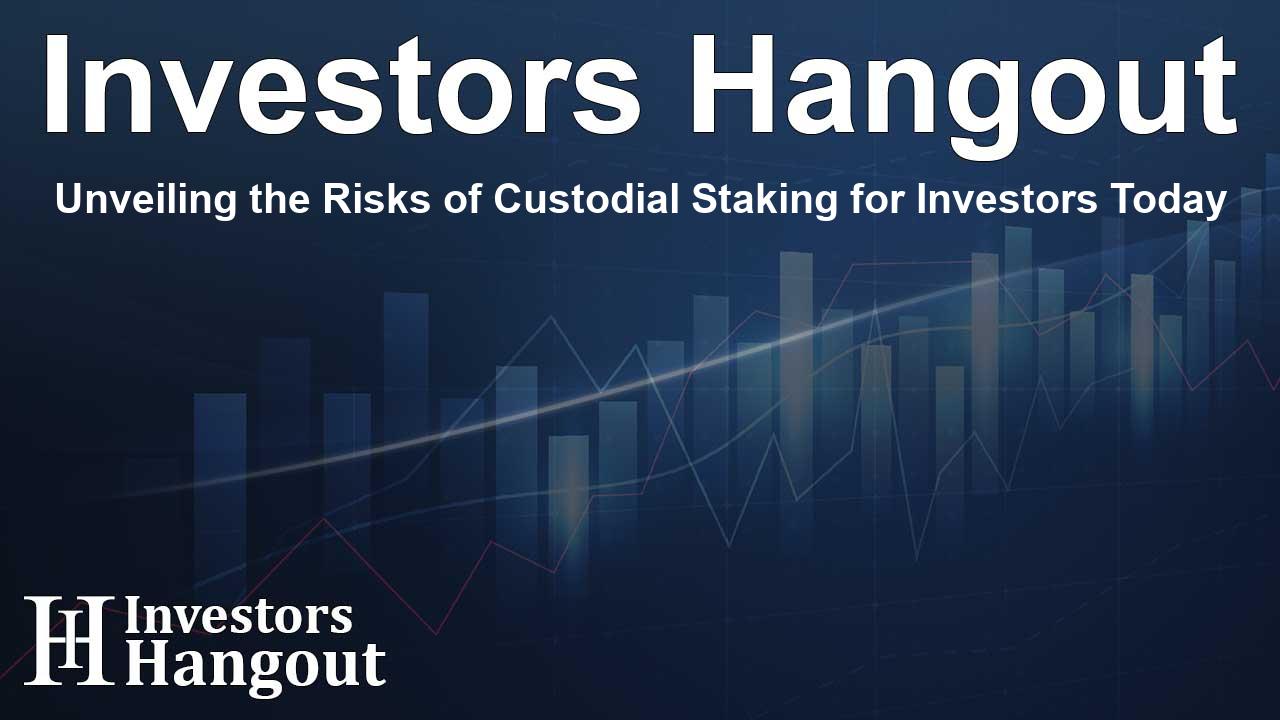Unveiling the Risks of Custodial Staking for Investors Today

Understanding the Risks of Custodial Staking
In the evolving world of DeFi, attention is increasingly being drawn to custodial staking platforms and their hidden fees that impact yields negatively. Blocksize, a leading DeFi infrastructure provider based in Germany, highlights these concerns, explaining how they can undermine governance and exert downward pressure on the price of Solana. It's vital for investors to be aware of the potential pitfalls of these platforms.
The Dangers of Hidden Fees
Custodial staking is often marketed as a reliable source of yield, particularly appealing to family offices and institutional investors. The reality, however, is that while native Solana staking can yield up to 10%, custodial platforms frequently offer less, often pocketing the difference in hidden fees. These fees are then sold on the market, contributing to a constant pressure on SOL’s price due to ongoing sell volume.
Yield Erosion and Governance Challenges
The loss of yield is troubling enough, but another significant issue is the governance power that gets consolidated within custodial platforms. Investors who stake their Solana tokens via large exchanges may unknowingly relinquish their voting rights, impacting decisions crucial to the ecosystem’s health. For instance, back in 2024, Solana’s Proposal 228 aimed to maintain inflation at 0%, but it fell short of the necessary support, which raises concerns about the influence of exchange-controlled votes.
Importance of Transparency and Control
Christian Labetzsch, Co-Founder of Blocksize, has pointed out that family offices expect predictable yields from their staking. However, the current custodial dynamics can significantly diminish those returns while exercising governance in ways contrary to long-term delegator interests. This highlights the urgent need for enhanced transparency, non-custodial options, high-performance validators, and regulatory compliance to safeguard delegators' interests.
The Transparency Gap in Staking
Professional investors are recognizing that performance alone does not differentiate staking platforms. The concerns surrounding hidden fee structures, operational risks from anonymous validators, and governance capture are increasingly paramount. Situations where validators lack accountability only serve to deepen these issues, leading many to adopt the motto, 'Not your keys, not your coins'.
Blocksize's Innovative Solutions
To address these pressing issues, Blocksize offers non-custodial, institutional-grade staking, effectively restoring control to the delegators. Unlike anonymous entities, Blocksize names its wallet addresses and operates under strict German law, facilitating accountability and transparent operations.
Adhering to Institutional Standards
Furthermore, Blocksize's operations comply with high-level standards, which include customizable staking fees, advanced monitoring of infrastructure, and real-time performance transparency. So far, the company has successfully supported over ten protocols and has handled five million on-chain transactions. This impressive track record underscores Blocksize’s commitment to a fair and open DeFi ecosystem.
About Blocksize
Blocksize is a DeFi infrastructure provider situated in Frankfurt, specializing in non-custodial staking among other services. With years of experience and a solid compliance framework, they blend technical expertise with regulatory adherence. Their active participation in protocol governance and open-source tool contributions plays a vital role in fostering a robust blockchain ecosystem.
Frequently Asked Questions
What is custodial staking and why is it risky?
Custodial staking involves using third-party services that manage the staking process, which can lead to hidden fees and a loss of governance power for investors.
How can hidden fees affect staking yields?
Hidden fees often reduce the actual yield investors receive from staking, as these are deducted before returns are disbursed.
Why is governance important in staking?
Governance enables delegators to influence critical decisions within the blockchain ecosystem, and losing this power can adversely impact their interests.
What makes Blocksize different from other staking providers?
Blocksize emphasizes transparency, non-custodial control, and operates under strict regulations, providing a level of accountability that many custodial platforms lack.
How does Blocksize ensure performance transparency?
Blocksize publishes real-time data regarding validator performance and governance activities, enabling users to make informed decisions.
About The Author
Contact Evelyn Baker privately here. Or send an email with ATTN: Evelyn Baker as the subject to contact@investorshangout.com.
About Investors Hangout
Investors Hangout is a leading online stock forum for financial discussion and learning, offering a wide range of free tools and resources. It draws in traders of all levels, who exchange market knowledge, investigate trading tactics, and keep an eye on industry developments in real time. Featuring financial articles, stock message boards, quotes, charts, company profiles, and live news updates. Through cooperative learning and a wealth of informational resources, it helps users from novices creating their first portfolios to experts honing their techniques. Join Investors Hangout today: https://investorshangout.com/
The content of this article is based on factual, publicly available information and does not represent legal, financial, or investment advice. Investors Hangout does not offer financial advice, and the author is not a licensed financial advisor. Consult a qualified advisor before making any financial or investment decisions based on this article. This article should not be considered advice to purchase, sell, or hold any securities or other investments. If any of the material provided here is inaccurate, please contact us for corrections.
